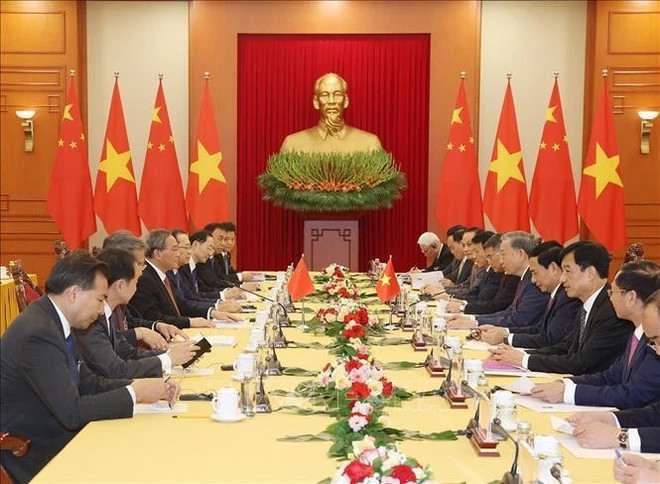Welcoming Li’s first visit to Vietnam as the Premier of China, Lam stressed that the visit is of important significance, as it helps develop the relationship between the two Parties and the two countries in a deeper and more substantive and comprehensive direction, meeting the aspirations and common interests of the two countries' people, for peace, cooperation, and development in the region and the world.
On the occasion of the 75th founding anniversary of the People's Republic of China, he congratulated the Chinese Party, State, and people on their significant achievements, especially the successful implementation of the reform and open-door policy, which has led to many important accomplishments in socio-economic development.
Especially in the 10 years of the new era since the Communist Party of China (CPC)’s 18th Congress, under the core leadership of General Secretary of the CPC Central Committee and President Xi Jinping, China has achieved its first centenary goal, Lam said, believing that the country will successfully realise the visions and goals of the 20th Party Congress, as well as over 300 reform measures to promote Chinese-style modernisation outlined at the third plenum of the 20th CPC Central Committee, towards the realisation of the second centenary goal.
"Vietnam always considers the development of relations with China as a top priority in its foreign policy," he stressed.
Conveying Xi’s best wishes to Lam, Li affirmed that his trip aims to implement the common perceptions reached by the highest-level leaders of the two Parties and countries in recent times, and to discuss specific measures to promote the comprehensive strategic cooperative partnership and the Vietnam-China community with a shared future to enter a new phase of development, achieving more substantive results.
Congratulating the Vietnamese people on their important achievements under the leadership of the CPV, the Chinese Premier emphasised that his country regards the development of relations with Vietnam as a priority in its neighbourhood diplomacy, and affirmed that the Chinese Party and Government consistently support Vietnam's renewal, development, and socialism construction.

In an atmosphere of friendship and trust, the leaders informed each other about the situation of each Party and each country. Lam briefed his guest on major positive results in socio-economic development, Party building and rectification, and the fight against corruption and negative phenomena in Vietnam in the past time, as well as preparations for the 14th National Congress of the CPV, which is identified as an important milestone, opening a new era - the era for realising the goal of successfully building socialism.
Host and guest also reviewed the outstanding achievements in bilateral cooperation in the past time, showing their delight at the important and comprehensive progress of the Vietnam-China relationship. They emphasised that the two sides have seriously and actively implemented the important high-level common perceptions reached during the historic visits of Party General Secretary Nguyen Phu Trong and General Secretary of the CPC Central Committee and President of China Xi Jinping in 2022 and 2023 respectively; and the state visit to China by General Secretary of the CPV Central Committee and State President To Lam to China in line with the “six major goals” (stronger political trust, more substantial cooperation in defence-security, deeper and more practical cooperation, more solid social foundation, closer multilateral coordination, and better management and settlement of differences).
These have helped formed a vibrant and effective exchange and cooperation situation at all levels, in all sectors and in all fields.
The top Vietnamese leader expressed his appreciation for Xi’s important contributions to the Vietnam-China relationship; highly valued Li’s attention and support for promoting the bilateral relations, as well as the effective and timely coordination between the two Governments and the two PMs.
Lam and Li agreed to maintain regular exchanges at all levels, especially the high level; effectively promote the channels of party diplomacy, state diplomacy, and people-to-people diplomacy; boost cooperation in the fields of defence, security, and foreign affairs; together respond effectively to non-traditional security challenges; and improve the effectiveness of existing mechanisms between the two countries and expand the implementation of new mechanisms.
Both sides agreed to continue directing agencies at all levels, sectors, and localities of the two countries to vigorously implement policies and measures to promote more substantive cooperation across various fields for better outcomes, boost economic and trade collaboration, ensure smooth border trade, and build the model of smart border gates as well as enhance the connection between the "Two Corridors, One Belt" framework and the “Belt and Road” Initiative, with priority given to boosting railway connectivity.
The top Vietnamese leader said Vietnam welcomes and is willing to create favourable conditions for Chinese enterprises to invest in large-scale, advanced technology projects in Vietnam, representing China's development level and bringing practical benefits to both nations and their people. The Chinese Premier emphasised that China will further open its market to Vietnamese agricultural products and support the neighbouring country in establishing trade promotion offices in China.
Both sides also pledged to expand cooperation in science and technology, manufacturing supply chains, green development, and digital transformation. Looking toward the 75th anniversary of their diplomatic relations next year, the two sides consented to jointly organise activities during the "Year of Vietnam-China Humanistic Exchange" and strived to elevate the bilateral relations to a new stage of development, guided by the "six major goals”.
Regarding maritime issues, they agreed on the importance of maintaining peace and stability in the East Sea (or South China Sea). Lam suggested that both sides strictly implement the high-level common perceptions, direct relevant authorities to actively seek effective methods and solutions to better control and resolve disagreements, and enhance cooperation in accordance with the level of bilateral relations, based on international law, particularly the 1982 United Nations Convention on the Law of the Sea (UNCLOS)./.VNA